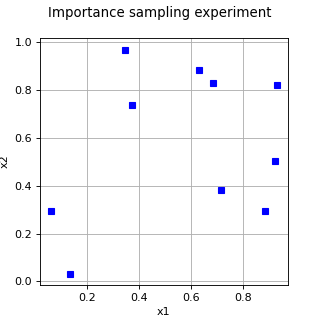ImportanceSamplingExperiment¶
(Source code, png, hires.png, pdf)

- class ImportanceSamplingExperiment(*args)¶
Importance Sampling experiment.
- Available constructors:
ImportanceSamplingExperiment(importanceDistribution)
ImportanceSamplingExperiment(importanceDistribution, size)
ImportanceSamplingExperiment(initialDistribution, importanceDistribution, size)
- Parameters
- initialDistribution
Distribution Distribution
which is the initial distribution used to generate the set of input data.
- sizepositive int
Number of points that will be generated in the experiment.
- importanceDistribution
Distribution Distribution
according to which the points of the experiments will be generated with the Importance Sampling technique.
- initialDistribution
See also
Notes
ImportanceSamplingExperiment is a random weighted design of experiments to get a sample
independently according to the distribution
. The sample is generated from the importance distribution
and each realization is weighted by
Examples
>>> import openturns as ot >>> ot.RandomGenerator.SetSeed(0) >>> distribution = ot.ComposedDistribution([ot.Uniform(0, 1)] * 2) >>> importanceDistribution = ot.ComposedDistribution([ot.Uniform(0, 1)] * 2) >>> experiment = ot.ImportanceSamplingExperiment(distribution, importanceDistribution, 5) >>> print(experiment.generate()) [ X0 X1 ] 0 : [ 0.629877 0.882805 ] 1 : [ 0.135276 0.0325028 ] 2 : [ 0.347057 0.969423 ] 3 : [ 0.92068 0.50304 ] 4 : [ 0.0632061 0.292757 ]
Methods
generate()Generate points according to the type of the experiment.
Generate points and their associated weight according to the type of the experiment.
Accessor to the object's name.
Accessor to the distribution.
getId()Accessor to the object's id.
getName()Accessor to the object's name.
Accessor to the object's shadowed id.
getSize()Accessor to the size of the generated sample.
Accessor to the object's visibility state.
hasName()Test if the object is named.
Ask whether the experiment has uniform weights.
Test if the object has a distinguishable name.
setDistribution(distribution)Accessor to the distribution.
setName(name)Accessor to the object's name.
setShadowedId(id)Accessor to the object's shadowed id.
setSize(size)Accessor to the size of the generated sample.
setVisibility(visible)Accessor to the object's visibility state.
getImportanceDistribution
- __init__(*args)¶
- generate()¶
Generate points according to the type of the experiment.
- Returns
- sample
Sample Points
which constitute the design of experiments with
. The sampling method is defined by the nature of the weighted experiment.
- sample
Examples
>>> import openturns as ot >>> ot.RandomGenerator.SetSeed(0) >>> myExperiment = ot.MonteCarloExperiment(ot.Normal(2), 5) >>> sample = myExperiment.generate() >>> print(sample) [ X0 X1 ] 0 : [ 0.608202 -1.26617 ] 1 : [ -0.438266 1.20548 ] 2 : [ -2.18139 0.350042 ] 3 : [ -0.355007 1.43725 ] 4 : [ 0.810668 0.793156 ]
- generateWithWeights()¶
Generate points and their associated weight according to the type of the experiment.
- Returns
Examples
>>> import openturns as ot >>> ot.RandomGenerator.SetSeed(0) >>> myExperiment = ot.MonteCarloExperiment(ot.Normal(2), 5) >>> sample, weights = myExperiment.generateWithWeights() >>> print(sample) [ X0 X1 ] 0 : [ 0.608202 -1.26617 ] 1 : [ -0.438266 1.20548 ] 2 : [ -2.18139 0.350042 ] 3 : [ -0.355007 1.43725 ] 4 : [ 0.810668 0.793156 ] >>> print(weights) [0.2,0.2,0.2,0.2,0.2]
- getClassName()¶
Accessor to the object’s name.
- Returns
- class_namestr
The object class name (object.__class__.__name__).
- getDistribution()¶
Accessor to the distribution.
- Returns
- distribution
Distribution Distribution used to generate the set of input data.
- distribution
- getId()¶
Accessor to the object’s id.
- Returns
- idint
Internal unique identifier.
- getName()¶
Accessor to the object’s name.
- Returns
- namestr
The name of the object.
- getShadowedId()¶
Accessor to the object’s shadowed id.
- Returns
- idint
Internal unique identifier.
- getSize()¶
Accessor to the size of the generated sample.
- Returns
- sizepositive int
Number
of points constituting the design of experiments.
- getVisibility()¶
Accessor to the object’s visibility state.
- Returns
- visiblebool
Visibility flag.
- hasName()¶
Test if the object is named.
- Returns
- hasNamebool
True if the name is not empty.
- hasUniformWeights()¶
Ask whether the experiment has uniform weights.
- Returns
- hasUniformWeightsbool
Whether the experiment has uniform weights.
- hasVisibleName()¶
Test if the object has a distinguishable name.
- Returns
- hasVisibleNamebool
True if the name is not empty and not the default one.
- setDistribution(distribution)¶
Accessor to the distribution.
- Parameters
- distribution
Distribution Distribution used to generate the set of input data.
- distribution
- setName(name)¶
Accessor to the object’s name.
- Parameters
- namestr
The name of the object.
- setShadowedId(id)¶
Accessor to the object’s shadowed id.
- Parameters
- idint
Internal unique identifier.
- setSize(size)¶
Accessor to the size of the generated sample.
- Parameters
- sizepositive int
Number
of points constituting the design of experiments.
- setVisibility(visible)¶
Accessor to the object’s visibility state.
- Parameters
- visiblebool
Visibility flag.
 OpenTURNS
OpenTURNS